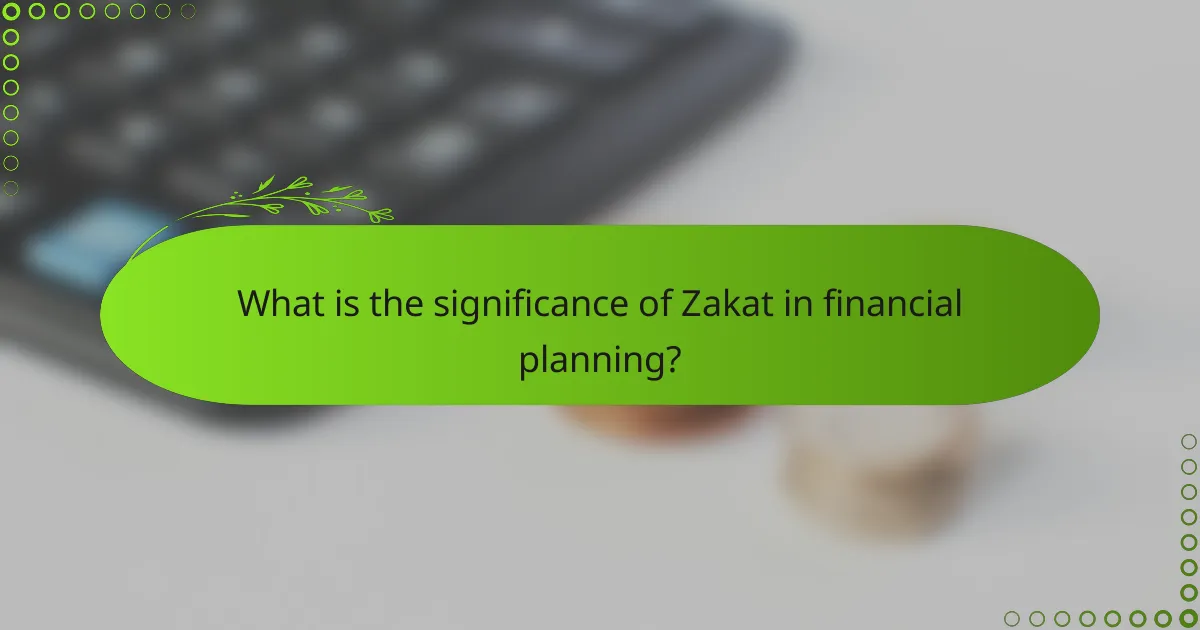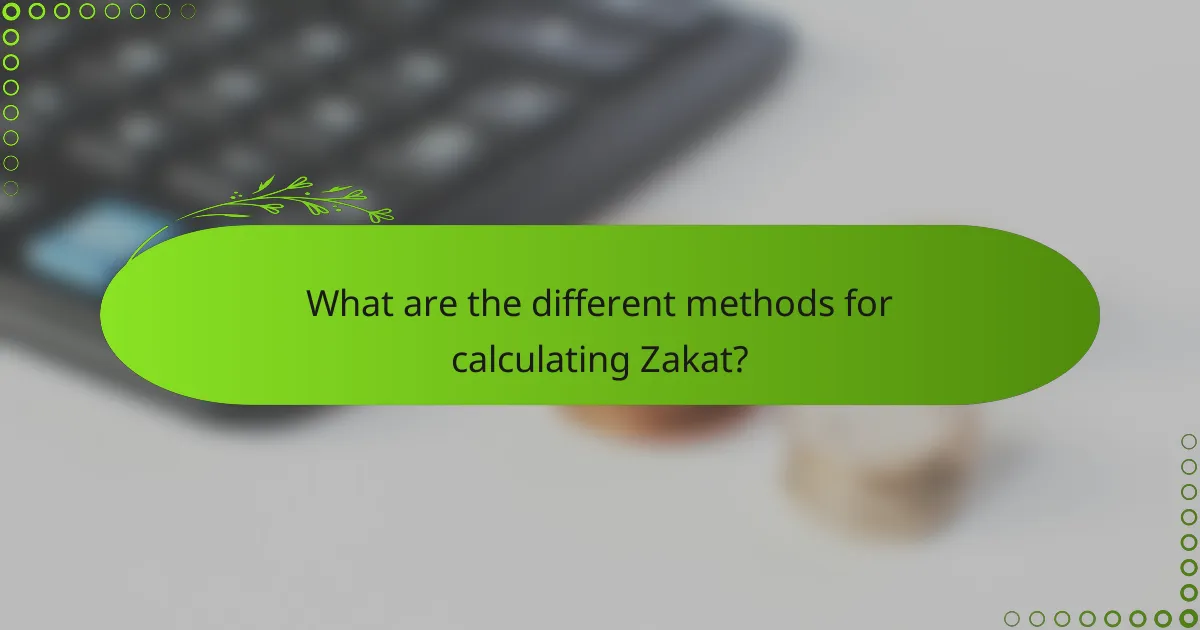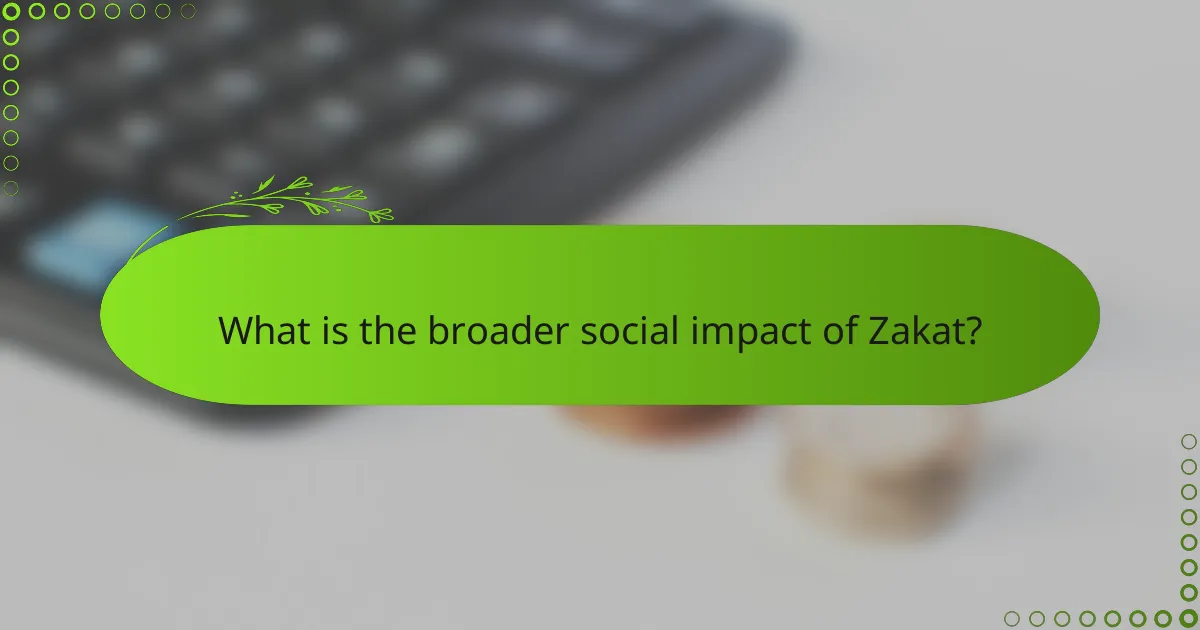
What is the significance of Zakat in financial planning?
Zakat is a mandatory form of almsgiving in [censured], representing a key pillar of the faith. Its significance in financial planning lies in its role in promoting social equity and responsible wealth distribution. By allocating a portion of wealth to those in need, Zakat helps alleviate poverty and supports community welfare. It encourages individuals to prioritize charitable giving within their financial strategies. This practice can also foster a sense of accountability and mindfulness regarding personal finances. According to Islamic teachings, Zakat is typically calculated as 2.5% of an individual’s savings and wealth annually. This calculation ensures that a consistent and fair contribution is made to support the less fortunate. Thus, Zakat integrates ethical considerations into financial planning, aligning personal wealth management with social responsibility.
How does Zakat contribute to individual financial health?
Zakat contributes to individual financial health by promoting responsible wealth distribution. It encourages individuals to allocate a portion of their wealth for charitable purposes. This practice helps reduce financial stress by fostering a sense of community support. Zakat can alleviate poverty, which in turn can create a more stable economic environment. Studies indicate that communities with active Zakat practices often experience enhanced economic growth. Furthermore, Zakat instills a sense of discipline in financial management. Individuals who regularly give Zakat may develop better budgeting habits. This leads to improved financial literacy and awareness of one’s financial situation.
What are the foundational principles of Zakat calculation?
The foundational principles of Zakat calculation are based on specific criteria outlined in Islamic teachings. Zakat is obligatory for Muslims who meet the Nisab threshold, which is the minimum amount of wealth one must possess. This threshold is typically set at the value of 85 grams of gold or its equivalent in cash.
Zakat is calculated at a rate of 2.5% of eligible wealth, including savings, investments, and certain business assets. The calculation excludes debts and liabilities, ensuring that only net wealth is considered.
Additionally, Zakat must be paid annually, and the calculation period is based on the lunar calendar. The intention to give Zakat is also a crucial aspect, as it must be done sincerely for the sake of Allah.
These principles ensure that Zakat serves its purpose of wealth redistribution and social welfare within the community.
How does Zakat impact personal budgeting and savings?
Zakat impacts personal budgeting and savings by mandating a portion of wealth to be allocated for charitable giving. This requirement encourages individuals to plan their finances more carefully. It reduces disposable income, which can lead to increased savings discipline. By setting aside Zakat, individuals prioritize their financial obligations. Research indicates that regular Zakat payments can enhance overall financial management. Studies show that those who practice Zakat often report improved budgeting skills. Additionally, it fosters a sense of community responsibility, influencing spending habits positively. Therefore, Zakat serves as both a financial commitment and a catalyst for better personal finance practices.
Why is Zakat important for community welfare?
Zakat is important for community welfare because it redistributes wealth to those in need. This act of giving helps alleviate poverty and supports vulnerable populations. By contributing a portion of their wealth, individuals fulfill a religious obligation and promote social equity. Zakat funds can be used for various community projects, such as education and healthcare. In 2020, global Zakat contributions were estimated at over $400 billion. This significant amount can substantially impact local economies and improve living conditions. Additionally, Zakat fosters a sense of community and responsibility among individuals. It encourages collective support for those facing financial hardships.
What role does Zakat play in poverty alleviation?
Zakat plays a crucial role in poverty alleviation by redistributing wealth within the community. It is a mandatory form of charity in [censured], requiring Muslims to give a portion of their savings to those in need. Typically, this amount is 2.5% of accumulated wealth annually. Zakat helps to provide financial support to the poor, enabling them to meet their basic needs.
Research shows that Zakat can significantly reduce poverty levels in communities where it is practiced. According to a study by the International Journal of Economics and Financial Issues, Zakat has been effective in improving the living standards of recipients. By addressing both immediate and long-term needs, Zakat fosters economic stability and growth.
Additionally, Zakat promotes social cohesion by encouraging a sense of responsibility among community members. This collective effort helps to uplift the entire community, reducing disparities in wealth and opportunity. Therefore, Zakat serves as a vital tool in the fight against poverty.
How does Zakat foster social responsibility among individuals?
Zakat fosters social responsibility among individuals by encouraging wealth redistribution. It mandates Muslims to give a portion of their savings to those in need. This practice promotes empathy and compassion within the community. Individuals become more aware of social inequalities through their contributions. Zakat helps alleviate poverty and supports community welfare programs. It reinforces the idea of collective responsibility towards societal well-being. By fulfilling this obligation, individuals contribute to a more equitable society. Studies show that Zakat can significantly reduce economic disparities in communities.

What are the different methods for calculating Zakat?
There are several methods for calculating Zakat. The most common method is the Nisab threshold. This is the minimum amount of wealth one must possess before Zakat becomes obligatory. The Nisab is typically set at the value of 85 grams of gold or 595 grams of silver.
Another method involves calculating Zakat based on the total savings and assets. This includes cash, gold, silver, and business inventory. The standard rate for Zakat is 2.5% of the total wealth.
Additionally, Zakat can be calculated on agricultural produce. The rate varies depending on whether the produce is irrigated or rain-fed. For irrigated crops, Zakat is 5%, while for rain-fed crops, it is 10%.
Finally, there are specific guidelines for calculating Zakat on investments and retirement accounts. The Zakat due is based on the current market value of these assets.
These methods ensure that Zakat is calculated accurately, promoting fairness and social responsibility.
How do different assets affect Zakat calculations?
Different assets affect Zakat calculations by determining the amount subject to Zakat. Zakat is typically calculated at 2.5% of qualifying assets. These assets include cash, gold, silver, and business inventory. Each asset type has specific rules regarding its valuation. For example, cash is valued at its face value. Gold and silver are valued based on market prices. Business inventory is assessed based on its current market value. Liabilities can also affect calculations by reducing the amount subject to Zakat. Therefore, understanding the nature and value of each asset is essential for accurate Zakat calculations.
What are the specific rates for various forms of wealth?
The specific rates for various forms of wealth in relation to Zakat are as follows. For cash and liquid assets, the rate is 2.5%. For gold and silver, the Zakat rate is also 2.5%. Agricultural produce is typically subject to a rate of 5% if irrigated, and 10% if rain-fed. Livestock Zakat varies; for camels, it is 5 camels for 5% and 10 camels for 10%. For trade goods, the rate is 2.5% of their market value. These rates are established based on Islamic jurisprudence and are widely accepted in the Muslim community.
How is Zakat calculated on business income?
Zakat on business income is calculated based on the net profits of the business. The standard rate for Zakat is 2.5% of the net income. First, determine the total income generated by the business. Next, subtract all allowable business expenses and liabilities. The remaining amount is the net profit, which is subject to Zakat. For accurate calculation, it is essential to consider all sources of income. This method ensures compliance with Islamic financial principles. Zakat serves as a means of wealth redistribution and social responsibility.
What tools and resources are available for Zakat calculation?
Zakat calculation tools and resources include online calculators, mobile apps, and educational websites. Online calculators allow users to input their assets and liabilities for accurate Zakat assessment. Popular mobile apps provide user-friendly interfaces for tracking wealth and calculating Zakat. Educational websites offer detailed guides and articles on Zakat principles and calculation methods. Community organizations also provide resources and workshops to educate individuals on Zakat obligations. These tools enhance understanding and ensure accurate calculations, fostering responsible financial planning.
How can technology assist in calculating Zakat accurately?
Technology can assist in calculating Zakat accurately by providing automated tools and software. These tools can track income and assets in real-time. They can also calculate the exact amount of Zakat owed based on current financial data. Mobile applications are available that simplify the process for users. Many of these apps include built-in calculators specifically for Zakat. They often incorporate features that help users understand their obligations. Additionally, online platforms can provide educational resources about Zakat calculation. Data analytics can enhance accuracy by analyzing financial trends over time. This integration of technology ensures that calculations are precise and timely.
What online calculators are recommended for Zakat assessment?
Zakat assessment can be accurately calculated using several online calculators. Recommended options include the Zakat Calculator by Islamic Relief, which provides a user-friendly interface and clear guidance on calculating Zakat based on various assets. Another option is the Zakat Calculator by Muslim Aid, which allows users to input their financial details and generates an accurate assessment. The Zakat Foundation also offers an online calculator that factors in different types of wealth and liabilities. These calculators ensure that individuals fulfill their Zakat obligations correctly and efficiently.

What is the broader social impact of Zakat?
Zakat has a profound broader social impact by promoting economic equity and alleviating poverty. It redistributes wealth from the affluent to the less fortunate. This mechanism fosters community welfare and social cohesion. Studies indicate that Zakat can significantly reduce income inequality. For example, in countries with strong Zakat practices, poverty rates are notably lower. Zakat also encourages charitable behavior among individuals. It strengthens the social fabric by creating a sense of responsibility towards others. Furthermore, Zakat funds often support education and healthcare initiatives. This investment in human capital leads to long-term societal benefits.
How does Zakat influence economic stability in communities?
Zakat influences economic stability in communities by redistributing wealth and reducing poverty. It provides financial assistance to those in need, which stimulates local economies. When individuals receive Zakat, they can meet basic needs and invest in small businesses. This investment creates jobs and fosters economic growth. Studies show that communities with high Zakat contributions experience lower poverty rates. The World Bank reports that effective Zakat distribution can lead to improved economic conditions. Additionally, Zakat encourages a culture of giving, which strengthens community bonds. Overall, Zakat plays a critical role in enhancing economic stability through wealth redistribution and community support.
What evidence exists to support the social benefits of Zakat?
Zakat provides significant social benefits by redistributing wealth and reducing poverty. Studies show that Zakat can improve community welfare and support social cohesion. For instance, research by the International Journal of Sociology and Social Policy indicates that Zakat leads to improved living standards for recipients. In many Muslim-majority countries, Zakat funds are used for education, healthcare, and housing, which directly enhance social infrastructure. Additionally, a report from the World Bank highlights that Zakat contributes to economic stability by increasing disposable income for low-income families. This financial support enables beneficiaries to invest in their futures, fostering long-term community development.
How does Zakat contribute to community development projects?
Zakat contributes to community development projects by providing essential funding for social welfare initiatives. It is a form of almsgiving required in [censured], aimed at redistributing wealth to support the less fortunate. Community development projects often include education, healthcare, and infrastructure improvements. The funds collected through Zakat can be allocated to build schools, hospitals, and provide vocational training programs. This financial support helps elevate living standards and reduces poverty within communities. According to a study by the Islamic Development Bank, Zakat has the potential to generate billions in funding for development projects globally. This demonstrates its significant role in fostering economic growth and social equity.
What best practices should individuals follow when giving Zakat?
Individuals should follow several best practices when giving Zakat. First, they must calculate their Zakat accurately based on their wealth. This includes assessing all assets such as cash, investments, and property. The standard rate for Zakat is 2.5% of eligible wealth.
Next, individuals should ensure that their Zakat is given to deserving recipients. This typically includes the poor, needy, and those in debt. It is advised to prioritize local recipients to support the immediate community.
Additionally, individuals should give Zakat promptly, ideally during the month of Ramadan. This is when the rewards for charitable acts are believed to be multiplied.
Transparency in the giving process is also crucial. Individuals should keep records of their Zakat contributions for personal accountability and to track their giving over time.
Lastly, individuals should seek knowledge about Zakat rules and regulations. Understanding the religious obligations can enhance the spiritual aspect of giving. Following these practices ensures that Zakat is given effectively and fulfills its intended purpose.
How can one ensure their Zakat is used effectively?
To ensure Zakat is used effectively, one should research and select trustworthy organizations. These organizations should have a transparent track record in distributing Zakat. Verifying their financial reports can provide insight into their operations. Engaging with local community initiatives can also ensure direct impact. Monitoring the outcomes of Zakat distribution helps assess effectiveness. The Islamic Relief Worldwide report indicates that effective Zakat distribution can significantly alleviate poverty. Lastly, setting specific goals for Zakat can guide its allocation toward meaningful causes.
What common mistakes should be avoided in Zakat giving?
Common mistakes to avoid in Zakat giving include miscalculating the amount owed. Many individuals overlook specific assets that are subject to Zakat. This can lead to underpayment. Another mistake is failing to distribute Zakat to eligible recipients. Zakat should be given to those who meet the criteria outlined in Islamic teachings. Some people also delay their Zakat payments. Timely payment is essential to fulfill this religious obligation. Additionally, giving Zakat in non-monetary forms can be problematic. Cash is often more effective for recipients in need. Lastly, not keeping records of Zakat payments can lead to confusion. Proper documentation ensures accountability and accuracy in future calculations.
Zakat is a mandatory form of almsgiving in [censured] that plays a crucial role in financial planning by promoting social equity and responsible wealth distribution. This article explores the significance of Zakat, including its impact on individual financial health, community welfare, and poverty alleviation. It outlines the foundational principles and various methods for calculating Zakat, as well as the specific rates applicable to different assets. Additionally, the article addresses how Zakat fosters social responsibility and contributes to community development projects, while also providing best practices for effective giving and common mistakes to avoid.